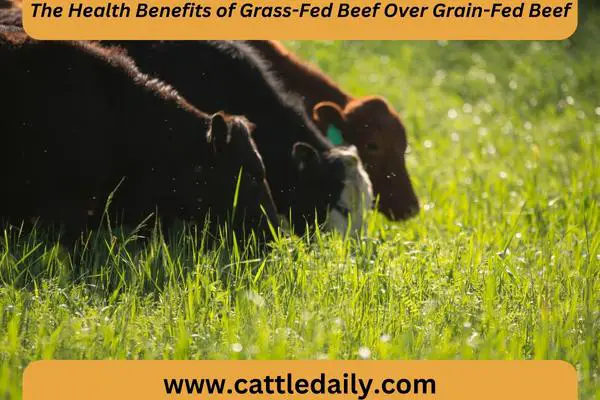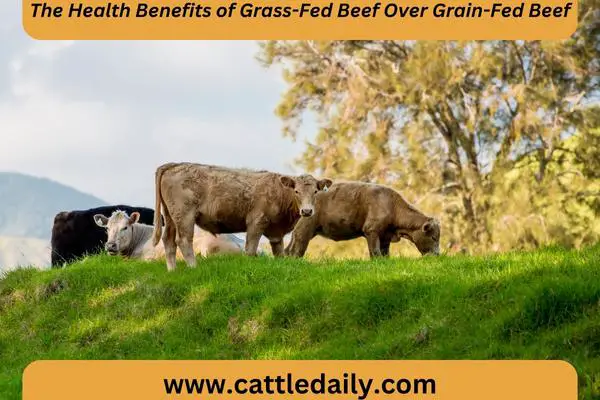The Health Benefits of Grass-Fed Beef Over Grain-Fed Beef
Beef is a nutrient-dense food that offers many vitamins, minerals, and antioxidants. However, not all beef is created equal when it comes to nutritional value. Grass-fed and grain-fed cattle farming can produce beef with vastly different nutrient profiles.
As consumer interest in organic, sustainable foods continues to grow, many people wonder if grass-fed beef is truly better than conventionally raised, grain-fed beef.
Research shows grass-fed beef nutrition is superior, offering more vitamins, antioxidants, and healthy fats, as well as fewer calories.
What’s the Difference Between Grass-Fed and Grain-Fed Cattle?
The terms grass-fed and grain-fed refer to what cattle eat for most of their lives. Here’s a quick look at the key differences in how they’re raised:
Grass-Fed Cattle:
- Spend entire lives on pasture, eating only grass and forage
- Not given grains or other supplements
- Allowed to graze freely on open pastures
Grain-Fed Cattle:
- Spend last 4-6 months confined in feedlots
- Fed an intensive high-calorie grain diet plus protein supplements
- Motivated to gain weight quickly before slaughter
From an animal welfare perspective, the lives of grass-fed cattle better resemble the natural behaviors of these grazing herd animals. However, grain finishing leads to greater intramuscular fat, or “marbling,” which some consumers desire for taste.
When it comes to nutritional content, studies consistently show grass-fed beef’s superiority over feedlot beef. Here’s an in-depth look at the evidence.

More Omega-3s and Conjugated Linoleic Acid (CLA)
Meat from grass-fed cattle provides significantly more omega-3 fatty acids. Omega-3s serve vital functions in human health, including lowering inflammation and heart disease risk.
In addition, grass-fed beef contains higher levels of CLA, a type of heart-healthy, anticarcinogenic fatty acid.
Research shows grass-fed beef can contain 2-3 times more omega-3s than grain-fed beef. It also provides significantly more CLA than conventional beef. Diets with more omega-3-rich foods and CLA may prevent inflammatory diseases and certain cancers.
Higher in Antioxidants Like Glutathione and Vitamins C and E
Antioxidants protect cells from damage and stave off chronic diseases. Grass-fed beef nutrition includes higher levels of key antioxidants like glutathione and vitamins C and E.
Glutathione, the body’s master antioxidant, supports immune health and detoxification. Vitamins C and E also combat free radicals and inflammation in the body. Grass-fed meat eating may raise glutathione levels compared to grain-fed meat.
More Micronutrients Like Iron, Zinc, and B Vitamins
Beef is prized for its high iron content, but grass-fed beef contains even more than conventional grain-fed meat. The iron in grass-fed beef is also more easily absorbed, which combats anemia and supports metabolism and growth.
Other critical micronutrients like zinc, selenium, phosphorus, and B vitamins are also more abundant in pasture-raised beef. Many Americans are deficient in these essential vitamins and minerals vital for proper functioning.
Fewer Calories and Healthier Fat Profile
Despite misconceptions, grass-fed beef is typically lower in total fat than feedlot beef. It also has a healthier ratio of omega-6 to omega-3 fats for improved cardiovascular wellness.
Calorie for calorie, grass-fed beef delivers more essential fatty acids, vitamins, and minerals than grain-fed options. Pasture raising also results in leaner meat with fewer calories per serving.
The Verdict: Grass-Fed Beef is Nutritionally Superior
An overwhelming amount of science confirms grass-fed beef’s nutritional advantages over feedlot beef. Meat from cattle raised primarily on pasture delivers more total nutrients.
Grass-fed beef is higher in omega-3s, CLAs, glutathione, vitamins C and E, iron, zinc, selenium and B vitamins. It also has a better balance of lean protein to fat compared with grain-fed cattle.
Today’s health-conscious consumers rightfully demand higher quality food options, including more sustainable, humanely raised meat. Opting for grass-fed beef over feedlot beef provides superior nutrition for better health. Learn here more about cattle food guides and tips.


